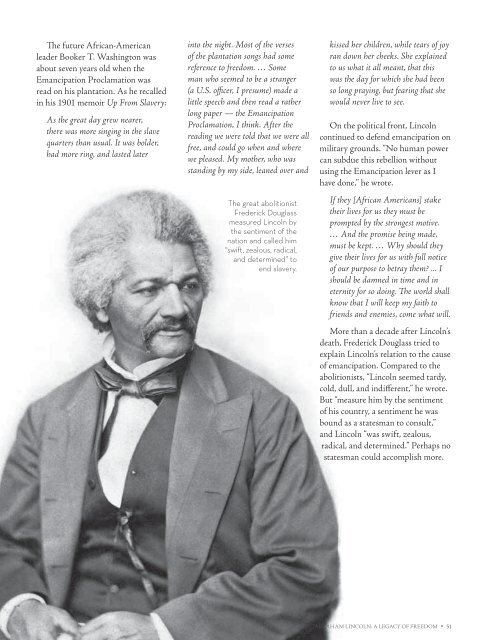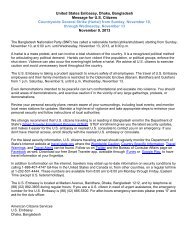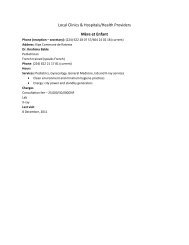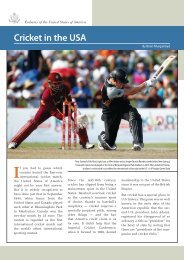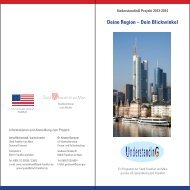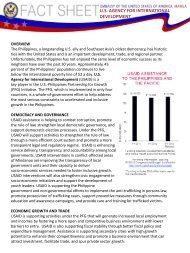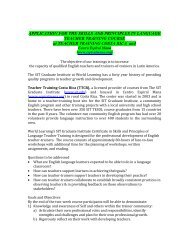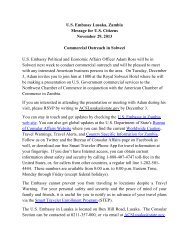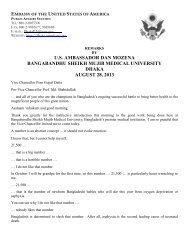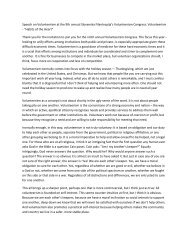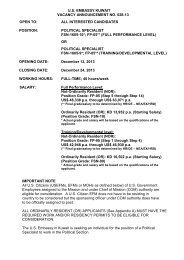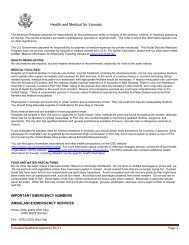Abraham Lincoln: A Legacy of Freedom - US Department of State
Abraham Lincoln: A Legacy of Freedom - US Department of State
Abraham Lincoln: A Legacy of Freedom - US Department of State
You also want an ePaper? Increase the reach of your titles
YUMPU automatically turns print PDFs into web optimized ePapers that Google loves.
The future African-American<br />
leader Booker T. Washington was<br />
about seven years old when the<br />
Emancipation Proclamation was<br />
read on his plantation. As he recalled<br />
in his 1901 memoir Up From Slavery:<br />
As the great day grew nearer,<br />
there was more singing in the slave<br />
quarters than usual. It was bolder,<br />
had more ring, and lasted later<br />
into the night. Most <strong>of</strong> the verses<br />
<strong>of</strong> the plantation songs had some<br />
reference to freedom. … Some<br />
man who seemed to be a stranger<br />
(a U.S. <strong>of</strong>ficer, I presume) made a<br />
little speech and then read a rather<br />
long paper — the Emancipation<br />
Proclamation, I think. After the<br />
reading we were told that we were all<br />
free, and could go when and where<br />
we pleased. My mother, who was<br />
standing by my side, leaned over and<br />
<br />
<br />
<br />
<br />
<br />
<br />
<br />
<br />
kissed her children, while tears <strong>of</strong> joy<br />
ran down her cheeks. She explained<br />
to us what it all meant, that this<br />
was the day for which she had been<br />
so long praying, but fearing that she<br />
would never live to see.<br />
On the political front, <strong>Lincoln</strong><br />
continued to defend emancipation on<br />
military grounds. “No human power<br />
can subdue this rebellion without<br />
using the Emancipation lever as I<br />
have done,” he wrote.<br />
If they [African Americans] stake<br />
their lives for us they must be<br />
prompted by the strongest motive.<br />
… And the promise being made,<br />
must be kept. … Why should they<br />
give their lives for us with full notice<br />
<strong>of</strong> our purpose to betray them? ... I<br />
should be damned in time and in<br />
eternity for so doing. The world shall<br />
know that I will keep my faith to<br />
friends and enemies, come what will.<br />
More than a decade after <strong>Lincoln</strong>’s<br />
death, Frederick Douglass tried to<br />
explain <strong>Lincoln</strong>’s relation to the cause<br />
<strong>of</strong> emancipation. Compared to the<br />
abolitionists, “<strong>Lincoln</strong> seemed tardy,<br />
cold, dull, and indifferent,” he wrote.<br />
But “measure him by the sentiment<br />
<strong>of</strong> his country, a sentiment he was<br />
bound as a statesman to consult,”<br />
and <strong>Lincoln</strong> “was swift, zealous,<br />
radical, and determined.” Perhaps no<br />
statesman could accomplish more.<br />
ABRAHAM LINCOLN: A LEGACY OF FREEDOM 51


